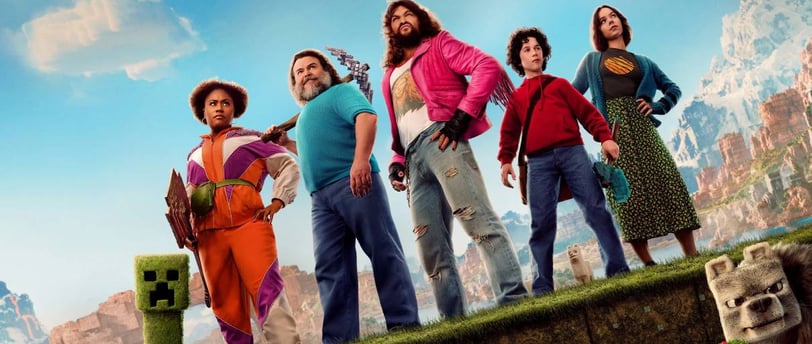Minecraft on the Big Screen: How Virtual Reality Could Make the Block World Real
The Minecraft movie makes us dream, but how close are we to physically entering this block universe? Explore how advances in virtual reality, haptic technologies, and the metaverse are bringing fiction closer to reality, forever transforming our gaming and digital interaction experience.
VIRTUAL/AUGMENTED REALITYMOVIESGAMES
By Nova 'Quantum' Valen
4/14/20253 min read


When the new Minecraft movie hit theaters, a question echoed in the minds of fans and technology enthusiasts alike: how far are we really from experiencing that block world in real life? The boundaries between fiction and reality have never been so thin, and the promise of an accessible block metaverse might be closer than we imagine.
The Cubic Revolution: From Pixel to Total Immersion
The Minecraft universe, with its characteristic aesthetic of pixelated blocks, revolutionized the concept of virtual worlds by offering virtually unlimited creative freedom. While we watch characters on the big screen navigating cube biomes, current Virtual Reality (VR) technology already allows us to take the first steps in this direction.
The VR version of Minecraft has existed for several years, but the gap between "playing in VR" and "living Minecraft" is still considerable. However, this gap shrinks with each new generation of headsets and advances in haptics (tactile technology).
The Current State of VR Technology for Minecraft-Type Worlds
Modern VR headsets already offer sufficient resolution to transform those square pixels into immersive environments. The Meta Quest 3, PlayStation VR2, and Valve Index allow players to "enter" the block world with complete stereoscopic vision, but significant limitations still exist:
Limited physical interaction: Although motion controllers allow "mining" and "building," the physical resistance of materials is lacking.
Restricted mobility: Walking freely in extensive virtual worlds remains a technological challenge.
Incomplete sensory immersion: Textures, temperatures, and other sensory stimuli remain absent.
From Screen to Touch: Emerging Technologies for a Tangible Minecraft
What needs to happen for us to really "feel" the blocks of the Minecraft world? Developing technologies show promising paths.
Haptic Gloves and Tactile Feedback
Companies like HaptX and bHaptics are rapidly advancing in developing gloves that simulate resistance, texture, and even temperature. Imagine feeling the roughness of a stone block or the softness of wool inside the game.
The sensation of digging virtual earth or feeling the rough surface of an obsidian block could completely transform the building experience, elevating immersion to levels never before experienced in digital games.
Omnidirectional Treadmills and Smart Rooms
To solve the mobility problem in virtual environments, omnidirectional treadmills like the Virtuix Omni and various location-based VR solutions are opening new horizons. These technologies allow the user to walk physically while staying in the same place in the real world or within a controlled environment.
Various research centers around the world are developing environments with pressure sensors on the floor that adapt the virtual terrain to the real surface, creating the sensation of climbing mountains or descending caves in worlds like Minecraft's.
The Block Metaverse: More Than A Game
The great revolution isn't just about playing Minecraft in VR, but how these technologies are redefining our relationship with virtual worlds as a whole.
Immersive Educational Applications
The educational potential of a "Minecraft metaverse" goes far beyond entertainment:
Architecture classes where students literally build and inhabit their projects
Historical simulations where students can reconstruct and explore ancient civilizations
Virtual chemistry laboratories where elements can be combined with real physical feedback
Socialization at New Levels
The social aspect of Minecraft has always been one of its strengths. A block-based metaverse would elevate this to a new level:
Work meetings or social gatherings in co-constructed environments
Cultural events such as concerts or exhibitions in customizable worlds
Group therapies in safe and adaptable environments
Technical and Ethical Challenges of Total Immersion
The path to a truly immersive Minecraft-style experience faces significant obstacles that go beyond pure technology.
Current Computational Limitations
To simulate block worlds with realistic physics and sensory feedback in real-time, we need:
Quantum processors or significant advances in parallel computing
Ultra-fast internet connections with near-zero latency
Long-lasting batteries for portable devices or efficient wireless energy solutions
Ethical Questions of the Metaverse
Deep immersion brings with it legitimate concerns:
Addiction to alternative realities: How to establish healthy boundaries?
Data privacy and security: Who controls what happens in these spaces?
Unequal access: How to prevent this type of technology from deepening digital inequality?
Is the Future in Blocks?
The Minecraft movie isn't just entertainment; it's a glimpse of future possibilities. As VR, haptics, and computing technologies advance, we're moving toward a point where the line between virtual and real worlds will become increasingly thin.
If the metaverse idealized by companies like Meta, Microsoft, and Epic Games actually materializes, it will likely have elements directly inspired by the accessible and infinitely customizable format that Minecraft pioneered.
What to Expect in the Next Decade
Experts predict that in the next 5-10 years, we might see:
VR headsets as light as common glasses
Haptic gloves with advanced feedback and micrometric motion sensors
"Phygital" (physical-digital) environments where real and virtual elements blend seamlessly
Generative AI creating content dynamically in block worlds
Build Your Path to the Future
Minecraft's journey – from a simple indie game to a cultural phenomenon with its own movie and potential to redefine our relationship with virtual worlds – is just the beginning.
How do you imagine using these technologies in the future? The possibilities are as infinite as a Minecraft world. The next time you watch the movie or play the game, consider that you might be glimpsing not just entertainment, but the future of human interaction with technology.
Nova 'Quantum' Valen is a researcher of emerging technologies and virtual worlds enthusiast. With a background in quantum computing and digital philosophy, she explores the frontiers between the possible and the imaginary, always with a critical eye and insatiable curiosity.
About us
Exploring science fiction and real technology.
Contacts
Geek
contato.realtechfiction@gmail.com
© 2025. All rights reserved.
